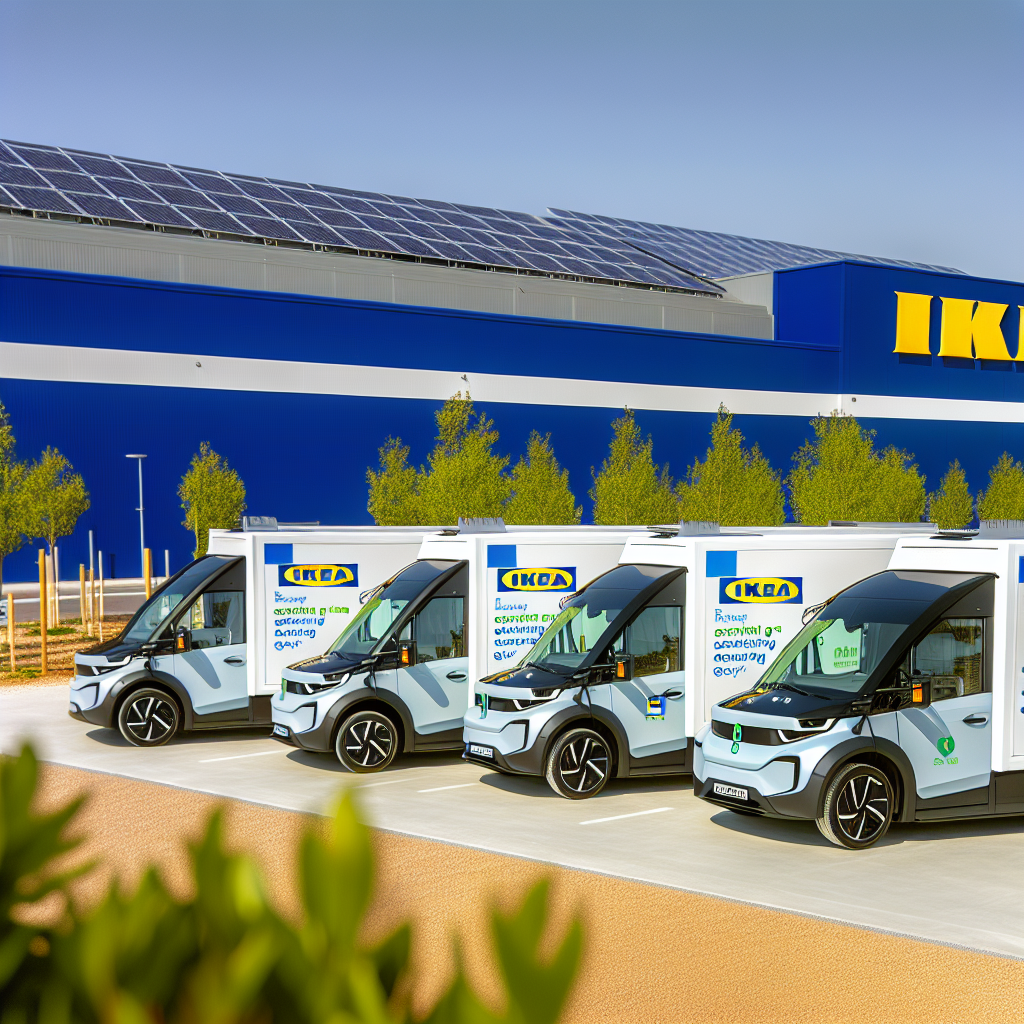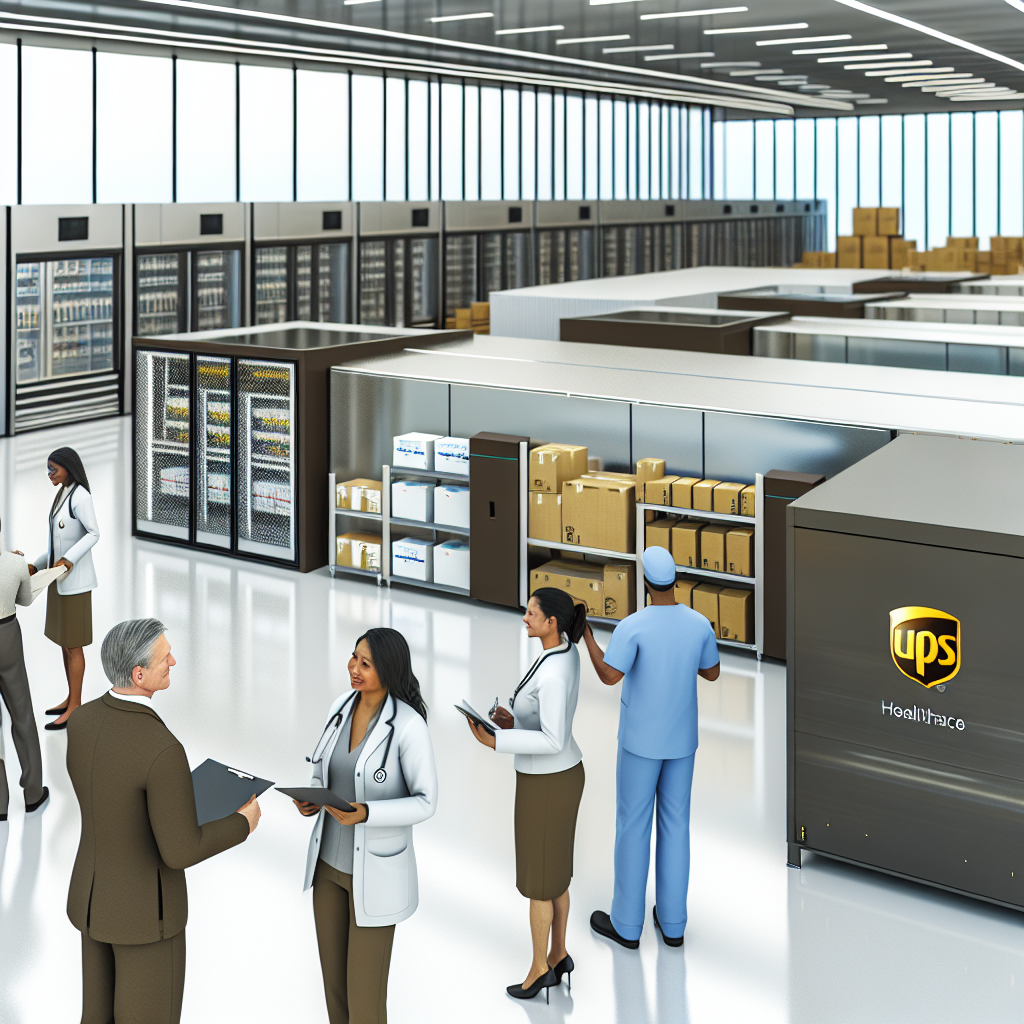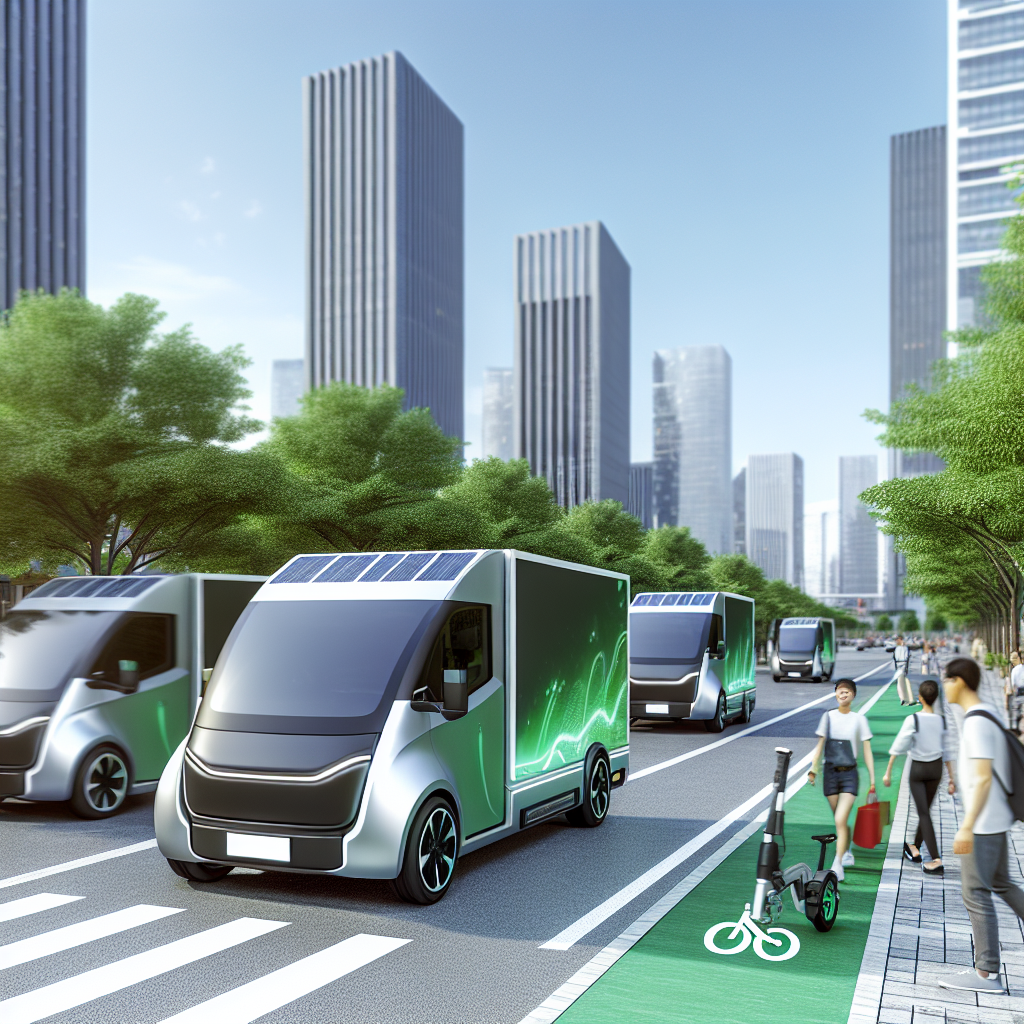In a groundbreaking achievement for sustainability in transportation, Ikea Canada has recently announced a significant milestone in green logistics: more than seventy-two percent of its big and bulky home deliveries were executed using electric vehicles (EVs) in August 2025, surpassing the number of deliveries made by diesel trucks for the very first time. This remarkable shift not only underscores Ikea’s commitment to environmental responsibility but also highlights the growing importance of sustainable deliveries in the logistics and supply chain industry.
By investing in EV infrastructure and prioritizing zero-emission vehicles, Ikea Canada is setting a new standard for sustainable delivery systems, paving the way for a greener future. As the company journeys toward its goal of achieving over ninety percent of home deliveries using zero-emission vehicles by 2028, it’s clear that this milestone is a testament to both innovative technology and a steadfast dedication to sustainability.
Their progress exemplifies the critical role that businesses play in the broader fight against climate change, showcasing how strategic partnerships and investments can lead to impactful environmental change.
Having more of our truck home deliveries fulfilled by EVs than diesel trucks in August 2025 is an incredible milestone in advancing Ikea Canada’s sustainability goals. This progress wouldn’t be possible without the strong collaboration with our delivery service partners, who share our commitment to innovation and environmental responsibility.
Ikea’s investments in EV charging infrastructure provide our delivery service partners with dedicated, reliable and safe access to power, ensuring they start each day fully charged and ready to deliver.
Ikea’s recent investment of $3.75 million in electric vehicle (EV) charging infrastructure represents a vital commitment to sustainability, particularly for its delivery service partners. By installing charging stations at 17 home delivery fulfillment locations across Canada, Ikea is not only enhancing its own fleet of electric vehicles but also supporting the network of partners that help facilitate deliveries. This investment is essential, as it provides these partners with dedicated access to reliable and safe charging facilities, which is crucial for maintaining operational efficiency.
With the logistics sector moving towards a greener future, having a robust EV charging infrastructure ensures that delivery service partners can start each day with their vehicles fully charged. This reliability helps to enhance delivery schedules and reduce potential downtimes associated with range anxiety. Moreover, it encourages these partners to embrace electric vehicles by removing barriers related to charging logistics, thus aligning with Ikea’s goal of achieving over 90% of home deliveries via zero-emission vehicles by 2028.
The importance of this investment goes beyond just operational benefits; it is a strategic move that supports Ikea’s sustainability goals and positions the company as a leader in the transition to eco-friendly logistics. As Ikea continues to innovate and expand its electric vehicle program, the partnership with delivery service providers, bolstered by substantial infrastructure investments, sets a strong foundation for a greener and more sustainable future in home delivery services.
Sustainability Goals
Ikea aims to have over ninety percent of its home deliveries use zero-emission vehicles by 2028. This ambitious goal is essential for environmental sustainability. By transitioning to electric vehicles, Ikea is addressing the climate crisis and reducing its carbon footprint. The transportation sector significantly contributes to greenhouse gas emissions, and this shift is a crucial step in minimizing the negative effects of climate change.
Aligning its initiatives with growing consumer demand for eco-friendly solutions, Ikea is setting an example for other companies in the retail sector. Achieving this target will not only help the planet but also enhance Ikea’s brand image and corporate responsibility.
Reaching this goal will require ongoing innovation in technology and logistics. Investing in charging infrastructure and collaborating with delivery partners is key to successfully transitioning to an electric fleet. Ikea is thereby laying the groundwork for vital changes in home delivery practices, reinforcing its commitment to sustainability and environmental leadership.
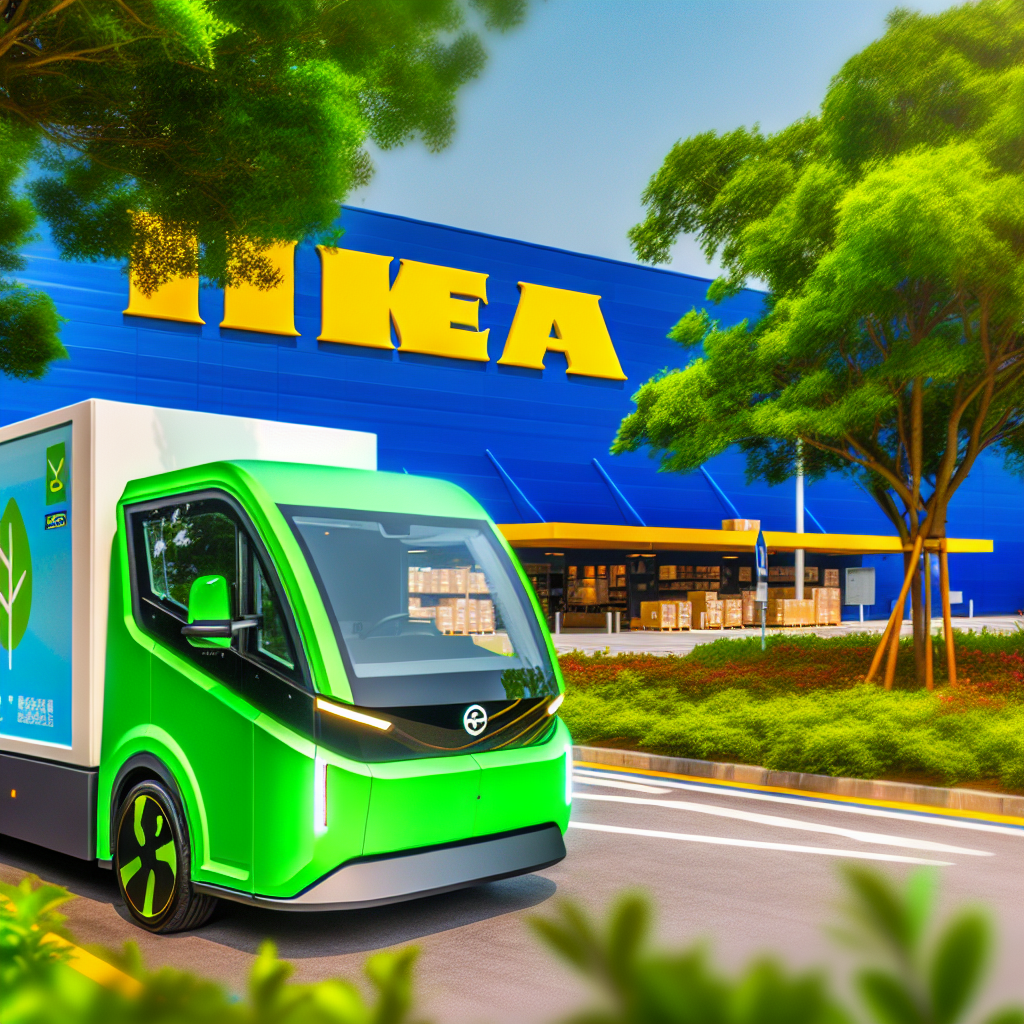
Image showcasing an electric delivery truck in an Ikea setting, symbolizing the transition to sustainable deliveries.
| Month | Percentage of Deliveries by EV | Percentage of Deliveries by Diesel |
|---|---|---|
| June 2025 | 60% | 40% |
| July 2025 | 68% | 32% |
| August 2025 | 72% | 28% |
Collaboration with Delivery Service Partners
Strong collaboration with delivery service partners has been instrumental in Ikea’s stride towards achieving its sustainability goals. These partnerships are founded on shared commitments to innovation and environmental responsibility, which have led to significant advancements in sustainable practices within the logistics sector. Ikea has worked closely with its delivery partners to identify and integrate best practices that enhance efficiency while minimizing environmental impact.
For instance, Ikea has prioritized partnerships with those who are equally eager to adopt electric vehicle technology, ensuring a unified approach toward reducing carbon footprints. This collaboration has spurred joint initiatives, such as training programs that educate delivery personnel on the benefits of electric vehicles (EVs) and eco-friendly practices in their operations.
Moreover, the alignment with delivery service partners extends to co-developing solutions that address logistical challenges. These shared innovations, such as optimized routing, not only increase operational efficiency but also reduce emissions associated with transportation. As deliveries evolve to utilize more zero-emission vehicles, these partners become essential players in Ikea’s long-term strategy for sustainability.
Ikea’s continued investment in charging infrastructure is another testament to this collaboration. By providing reliable charging solutions at fulfillment centers, Ikea empowers its delivery partners to seamlessly transition to electric fleets, enhancing their operational capabilities while aligning with Ikea’s sustainability vision.
Ultimately, Ikea’s collaborative approach with its partners showcases how collective efforts can drive significant progress toward shared sustainability goals, reflecting a model that can be replicated across various industries. Through these partnerships, Ikea not only strengthens its position as a leader in sustainable logistics but also paves the way for a more environmentally responsible future in home delivery services.
Collaboration with Delivery Service Partners
Strong collaboration with delivery service partners has been instrumental in Ikea’s stride towards achieving its sustainability goals. These partnerships are founded on shared commitments to innovation and environmental responsibility, which have led to significant advancements in sustainable practices within the logistics sector. Ikea has worked closely with its delivery partners to identify and integrate best practices that enhance efficiency while minimizing environmental impact.
For instance, Ikea has prioritized partnerships with those who are equally eager to adopt electric vehicle technology, ensuring a unified approach toward reducing carbon footprints. This collaboration has spurred joint initiatives, such as training programs that educate delivery personnel on the benefits of electric vehicles (EVs) and eco-friendly practices in their operations.
Moreover, the alignment with delivery service partners extends to co-developing solutions that address logistical challenges. These shared innovations, such as optimized routing, not only increase operational efficiency but also reduce emissions associated with transportation. As deliveries evolve to utilize more zero-emission vehicles, these partners become essential players in Ikea’s long-term strategy for sustainability.
Ikea’s continued investment in charging infrastructure is another testament to this collaboration. By providing reliable charging solutions at fulfillment centers, Ikea empowers its delivery partners to seamlessly transition to electric fleets, enhancing their operational capabilities while aligning with Ikea’s sustainability vision.
Ultimately, Ikea’s collaborative approach with its partners showcases how collective efforts can drive significant progress toward shared sustainability goals, reflecting a model that can be replicated across various industries. Through these partnerships, Ikea not only strengthens its position as a leader in sustainable logistics but also paves the way for a more environmentally responsible future in home delivery services.
Learn More About Sustainable Logistics:
- FreightAmigo Services Limited offers sustainable logistics solutions
- Telesto Strategy focuses on sustainability innovations
- JUSDA Supply Chain Management enhances sustainability
- Uber Eats partners with Flytrex for drone deliveries in the US
- PepsiCo expands electric vehicle fleet in California
- Amazon orders electric trucks from Daimler for a sustainable fleet
- DHL’s electric truck rental agreement with Daimler
- Walmart purchases electric delivery vehicles from Canoo
These links can further provide insights into how various companies are collaborating and innovating to develop sustainable delivery systems.
In conclusion, Ikea Canada’s remarkable milestone in achieving more electric vehicle (EV) deliveries than diesel trucks signifies a transformational shift in the logistics and delivery sector. This achievement not only underscores the company’s continuous commitment to sustainability but also reflects its proactive stance in addressing the pressing concerns of climate change. By investing in electric vehicle infrastructure and aiming for over ninety percent zero-emission home deliveries by 2028, Ikea demonstrates that large-scale companies can indeed take significant steps toward environmental responsibility.
As Ikea forges ahead, it encourages not just its partners but the entire industry to adopt sustainable practices in logistics. The transition to electric vehicles is not merely about reducing emissions; it’s about paving the way for a future where operational efficiency and environmental stewardship go hand in hand. Readers should reflect on the critical importance of these practices—not just for Ikea but for all companies striving to make a positive impact on the planet. In a world where sustainability is rapidly becoming a necessity, collaboration and innovation in logistics play a pivotal role in shaping a greener future.
Join the Sustainable Movement
If you are inspired by Ikea Canada’s commitment to sustainable delivery practices and their impressive achievements in electric vehicle technology, consider taking action yourself! You can explore more about Ikea’s sustainability initiatives and how they are working towards a greener future by visiting their sustainability page for in-depth information.
Additionally, we encourage you to share this article on social media to spread awareness about Ikea’s pioneering efforts in reducing their carbon footprint and promoting eco-friendly deliveries. Every share contributes to a greater understanding and a collective push towards sustainability! Let’s inspire others to embrace sustainable practices and make informed choices for our planet.
Together, we can make a difference!
Overview of Electric Vehicle Deliveries
Ikea’s recent milestone of over seventy-two percent of home deliveries being executed with electric vehicles marks a significant turning point in their logistics operations.
Transition to Sustainability
The shift from diesel trucks to electric vehicles is a strategic approach to reduce carbon emissions. By prioritizing this transition, Ikea sets a prime example for corporate responsibility towards environmental sustainability.
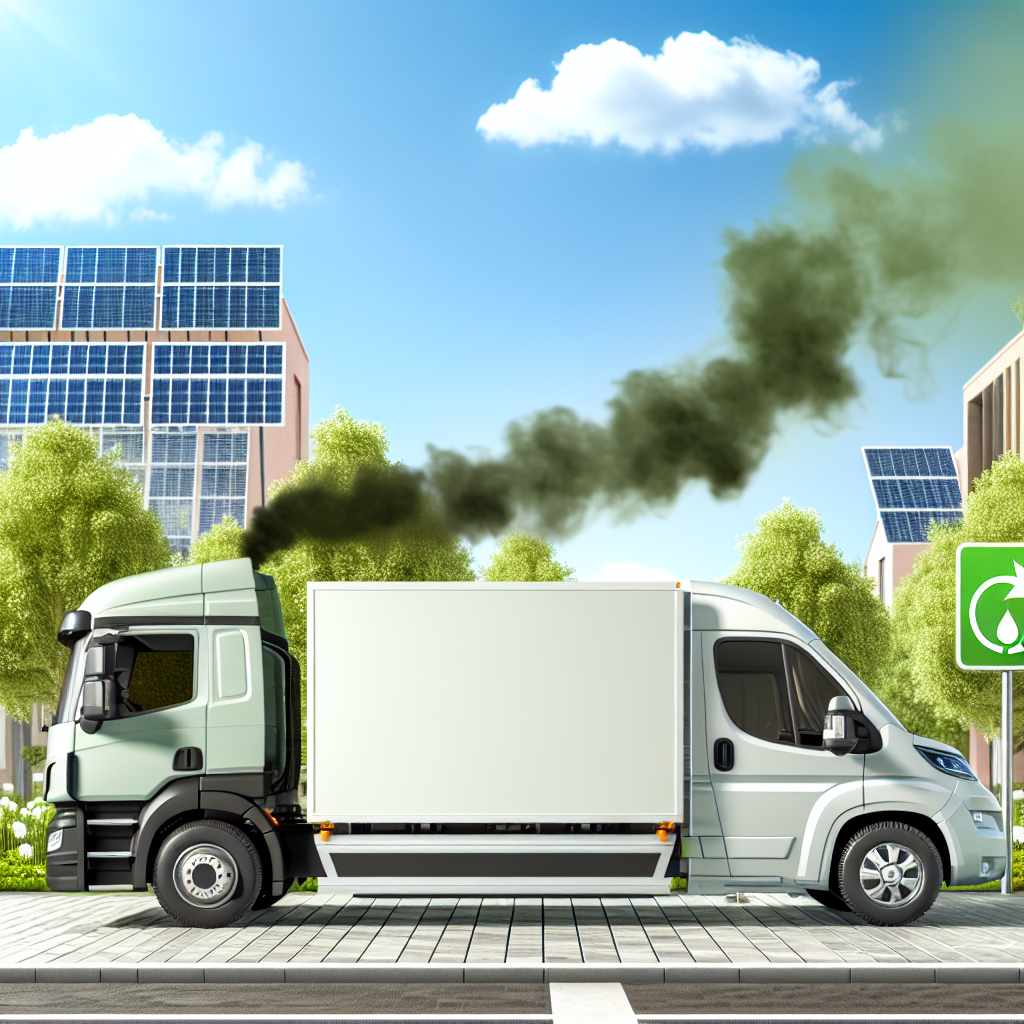
Visual comparison of traditional diesel delivery trucks versus electric delivery trucks, showcasing the benefits of electric vehicles in a delivery setting.
